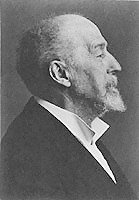Otto Wagner | |
|---|---|
 | |
| Born | Otto Koloman Wagner 13 July 1841 Vienna, Austrian Empire |
| Died | 11 April 1918 (aged 76) Vienna, Austria-Hungary |
| Occupation | Architect |
| Buildings | Nussdorf weir and lock Karlsplatz Stadtbahn Station Majolica House Postal Office Savings Bank Building Kirche am Steinhof |
| Projects | Wiener Stadtbahn |
Otto Koloman Wagner (German: [ˈɔto ˈkoːloman ˈvaːɡnɐ] ; 13 July 1841 – 11 April 1918) was an Austrian architect, furniture designer and urban planner. He was a leading member of the Vienna Secession movement of architecture, founded in 1897, and the broader Art Nouveau movement. Many of his works are found in his native city of Vienna, and illustrate the rapid evolution of architecture during the period. His early works were inspired by classical architecture. By mid-1890s, he had already designed several buildings in what became known as the Vienna Secession style. Beginning in 1898, with his designs of Vienna Metro stations, his style became floral and Art Nouveau, with decoration by Koloman Moser. His later works, 1906 until his death in 1918, had geometric forms and minimal ornament, clearly expressing their function. They are considered predecessors to modern architecture.[1]
- ^ Oudin, Dictionnaire des Architects, p. 536.